Ontario Premier Doug Ford’s government has confirmed it will weaken some of the new recycling rules set to take effect next year, though not to the extent initially proposed. The changes are part of the province’s ongoing transition to an extended producer responsibility system that shifts the cost of blue box programs away from municipalities and onto the companies that produce packaging and paper materials.
The move comes after industry complaints over sharply rising recycling costs, which the government attributes to inflation, labour shortages and supply chain disruptions. Over the summer, the Ministry of the Environment floated proposals to delay or cancel several obligations for producers, sparking strong opposition from environmental groups and concerned residents. The final decision, released this week, represents what the ministry describes as a more “balanced approach.”
A spokesperson for Environment Minister Todd McCarthy said the revised plan will still save municipalities hundreds of millions annually while ensuring blue box services remain available across the province. Under the new rules, producers will continue to operate under “best efforts” targets for recycling rates over the next two years before stricter enforcement begins. This is shorter than the five-year delay originally proposed.
Flexible plastics such as wraps, pouches and bags will face eased targets and deadlines, reflecting industry concerns that these items remain among the hardest to recycle. The Retail Council of Canada welcomed the added leeway but warned the government lacks a clear long-term strategy. At the same time, rules requiring producers to expand collection to more multi-residential buildings, retirement homes and schools have been delayed until 2031 instead of being removed entirely, a timeline environmental advocates say leaves too many residents without equal access for years to come.
Environmental Defence and other advocacy groups voiced disappointment that the province will still allow up to 15 per cent of non-recyclable materials that are incinerated to count toward recycling targets and that producers will no longer be required to expand collection in public spaces. Beverage container rules were also weakened, with enforceability delayed for residential recycling targets and a planned requirement covering containers used outside the home scrapped altogether.
Industry groups such as the Canadian Beverage Association support some of the amendments but urged the government to revisit a provincewide deposit-return program for non-alcoholic containers, calling it the most effective way to boost collection and recycling. Environmental groups echoed that call, arguing Ontario should integrate beverage containers into the existing deposit-return system currently managed through the Beer Store. With Beer Store locations closing and grocers resisting new requirements to take empties, advocates say the government now has a chance to fix both challenges by expanding the system.
The Ford government maintains that its changes are necessary to keep recycling affordable and workable for producers, but critics warn the compromises will weaken the province’s ability to build a truly consistent and effective recycling system for all residents.


